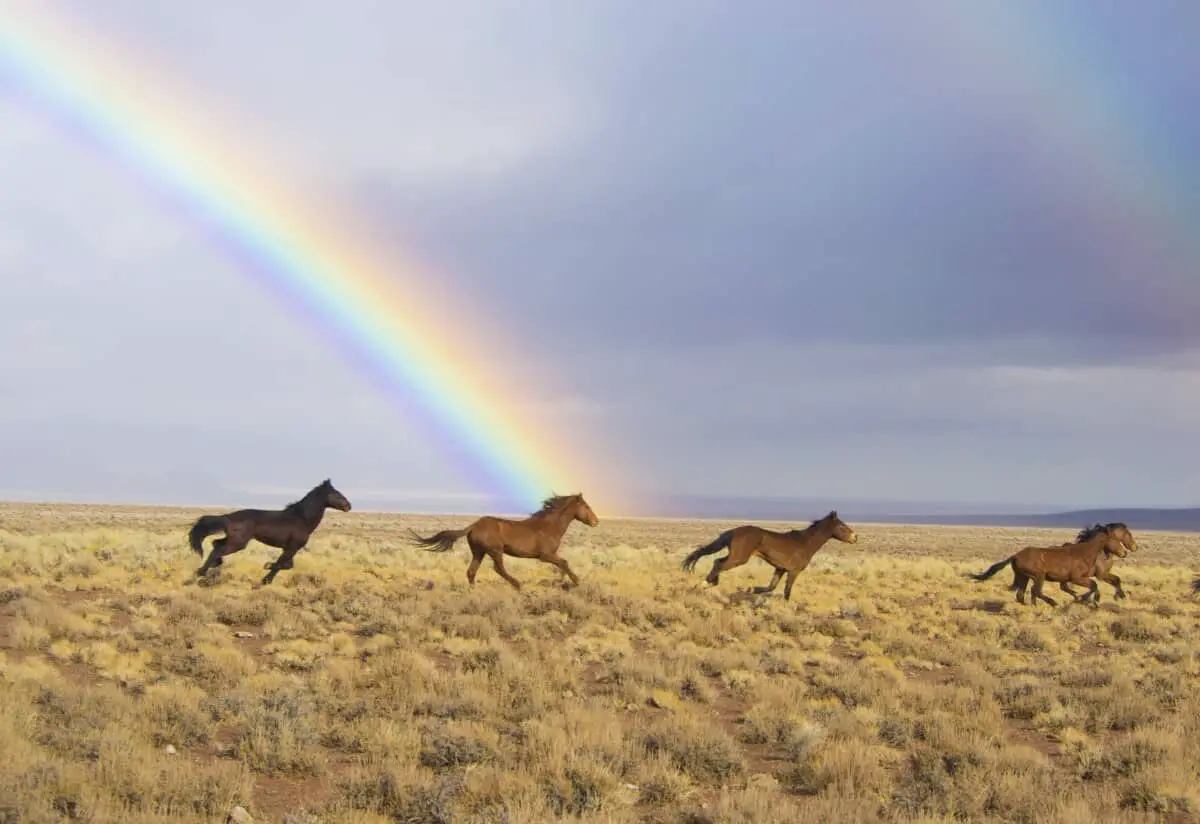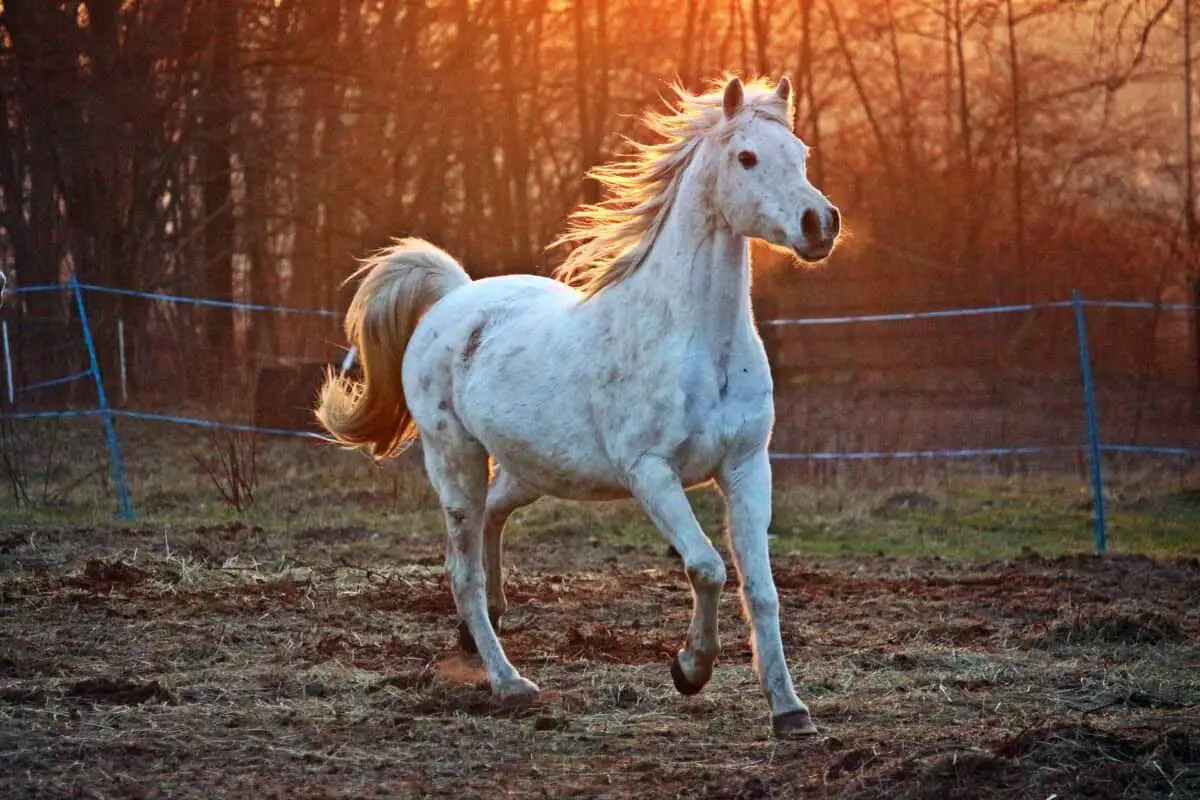Skip To Section
According to the Guinness World Records, the fastest a racehorse has run is 43.97mph or 70.76 km/h. The average horse speed ranges between 25 – 30 mph. The speed at which horses can gallop depends on many factors, including breed.
Basics Of A Horse’s Speed
A horse can walk, trot, canter, or gallop. Walking is the slowest. A trot is slightly faster than a walk. It is a two-beat gait characterized by the front and back legs moving in sync. A trot is the same as jogging and may be referred to as such in some cases. A canter or lope is a three-beat gait. It is slightly faster than a trot but isn’t a full gallop. A horse is said to be running if it gallops. A gallop is a 4-beat gait (the fastest gait).
Uninitiated riders tend to mistake different horse gaits. Anything besides a gallop can’t be referred to as running. Typically, horses walk at speeds ranging from 3 to 4 mph. A trot varies from 8 to 10 mph. A canter ranges from 10 to 17 mph, and a gallop is anything faster than that.

Why Are Horses Able To Run So Fast?
In case you’re wondering why horses are so fast, it’s worth noting that horses have been sought out by predators since time immemorial. As prey animals, horses are adapted to running (as a defense mechanism). Running at top speeds has always been a priority for horses in nature.
Today, horses are bred for high speed, making them even faster. Racehorse breeders choose horses based on their genetics. Years of breeding the fastest horses have led to even faster horses.
Horses are also able to run fast because of training. The physical capabilities of a horse don’t matter if a racehorse isn’t well trained. A horse’s frame and muscle mass may be perfect; however, he must be willing and interested in running to run fast. Most importantly, a horse needs to love running to be able to run fast. It takes some training to motivate a horse to reach potential.
In regards to speed, horses may be able to run faster in the future over short distances. Horse sprints seem to continue getting faster. However, long-distance horse speeds have plateaued given the current record was set in the 1970’s by Secretariat.
Factors That Can Affect A Horse’s Speed
There are many variables that affect a horse’s speed. The most notable include:
Horse Breed (Bloodline)
Thoroughbred horses are the fastest breed in the world. In fact, the fastest top speed record of 70.76kph is held by a thoroughbred horse. Thoroughbred horses became fast through centuries of selective horse breeding. The horses have enhanced elements of racing, ranging from a highly competitive racing temperament to unmatched energy in the racing track. Thoroughbreds also have a body to match their speed. They are tall and slim, which makes them agile, quick, and powerful.
Thoroughbreds are a combination of the fastest horse bloodlines ever (Turkoman, Barb, and Arabian horses). The three main horses responsible for “creating” the thoroughbred are the Darley Arabian, Godolphin Barb, and the Byerly Turk.
Besides the thoroughbred, American quarter horses are also in the top list of fastest horses in the world. The horse breed is known for its adaptability, versatility, and unmatched sprinting capabilities. The horse breeds offer unmatched speeds over short distances. American quarter horses are faster than thoroughbreds over short sprints. The horses are compact and muscular, with other notable characteristics like adaptability, average, and temperament.
Find out more amazing and interesting facts about American quarter horses.
In a nutshell, the breed of a horse determines many factors, including the speed. This is evident by the fact that thoroughbred horses were created through a rigorous breeding process over centuries involving the fastest horses.
Rider (Jockey)
Since racehorses need a rider (jockey) on their back to ride them, the choice of rider can affect their speed. For instance, a heavy jockey can slow down a horse. A lighter jockey is better; however, he/she shouldn’t be too light to give his horse an unfair advantage. This is precisely why a jockey’s weight is monitored by horse racing associations. Besides a jockey’s weight, their skill and experience also matter. A highly skilled and experienced jockey can be able to unlock the full potential of a racing horse he/she rides often. Jockeys must form strong bonds with their horses to be able to control them effectively.
Horse Frame
While most racing horses are thoroughbreds, their speed will still vary depending on the muscle fibers they have in their legs. Contrary to popular belief, muscle fiber matters more than the length of legs. A horse with just the right muscle fibers and length of legs will have an outright advantage over other horses with one advantage only (the right muscle fibers or length of legs).
Skeletal muscles are the most critical because they control movement. The muscles have two fibers (type 1 and type 2). Type 1 fibers contract slowly. They are critical for sustained endurance since they don’t fatigue quickly. Type 2 are critical for quick bursts like sprinting. The muscles give accurate clues on a horse’s sprinting power.
Stride Angle
Besides having the right muscle fiber, the stride angle of a horse should also be good. Horses with a longer stride angle have an outright advantage when running i.e., they are able to stretch out as well as recoil their frame faster. A typical racehorse has an average stride of 20 feet and makes 130 to 140 strides every minute. Renowned racehorses like the Man O’ War boasted of a stride measuring 28 feet. While the stride angle isn’t easy to determine, some of the fastest racehorses like the Secretariat recorded a stride angle of 110.
Headgear
A horse’s headgear while racing can also affect their speed. Typical headgear is composed of visors, blinkers, cheek pieces, tongue tie, and eye shield, which all play critical roles. Headgears are used to enhance a horse’s concentration and control. Horse handlers and jockeys are the best-placed individuals to choose the right headgear.
Exhaustion
Like athletes, racehorses also need time to recover. The days since a horse’s last run can affect their speed. Some racehorses perform the best when they haven’t run on a track for a while. Other horses perform better if they have run recently. While optimal fitness is critical, racehorses that are in optimal shape and health should be given at 14 to 30 days to prepare for the next race.
Other Factors
The running style of a horse can also dictate speed. Racehorses belonging to the same breed can exhibit different running styles. For instance, some horses love battles, while others just exhibit an easy ride when faced by competition. Other racehorses tend to get lonely when they are leading a race, which reduces their potential to run faster. However, such a running style may be better for a late lead.
Racehorses may also have other attributes that dictate their speed. For instance, racehorses with instant acceleration and a sharp turn tend to be held up in the back. When used adequately, this trait can allow a horse to conserve energy, initially utilizing it in the final burst. Racehorses that can’t accelerate quickly but maintain pace are better in front.
Many factors determine how fast a horse runs. While the breed is important, the importance of training, overall health, and a good jockey can’t be overlooked.

What Are The Fastest Horse Breeds?
Some horse breeds are faster than others. Racing breeds common in the U.S. include the Thoroughbred and American Quarter Horse. While both of these breeds are among the fastest, they perform differently in short distances. Quarter Horses excel in short distances while Thoroughbreds do well in long distances because they can maintain top speeds for a longer distance than their Quarter Horses. Thoroughbreds can run (gallop) at 40 – 45 mph while American Quarter Horses, which do great in short distances, can gallop at 50 mph.
Find out more about the differences between the two fastest horse breeds here.
What Is The Fastest Horse Ever? How Fast Do Racehorses Run?
According to Guinness Book World Records, the fastest horse record is held by Winning Brew. The record was set in 2008. Winning Brew ran at approximately 70.76kph over a distance of 0.402 kilometers.
Since then a speed of 55 mph has been clocked from a quarter horse, the fastest speed to have ever been recorded.
How Fast Does The Typical Horse Run?
Horses run at different speeds, given their differences in breeds, sizes, and shapes, among other factors. For instance, a horse from a slower breed can run faster than a thoroughbred if they are more athletic, better trained, etc. With all these factors in play, there’s no set standard for how fast a typical horse should run. There are thoroughbreds that are still slow despite them having the right bloodline for racing. However, in typical race cases, the average speed is 30 miles per hour + or – a few miles to cater for variables. Older horses with health or conditioning problems will run at significantly lower speeds.
Can A Horse Outrun A Car?
No. The fastest a racehorse has run is 55 mph. The slowest cars today can exceed such speeds easily. However, over short distances i.e. a few meters, a horse can be able to accelerate faster than most slow cars today.

